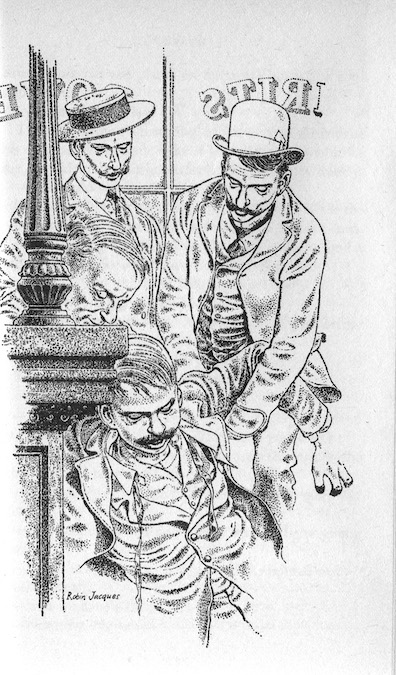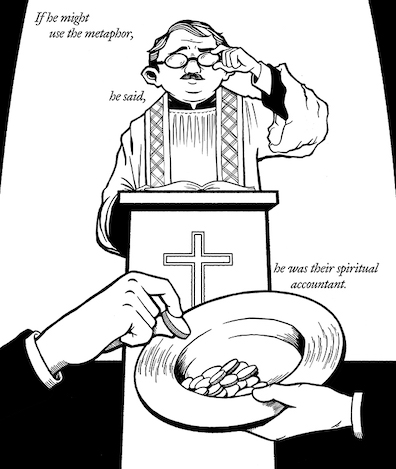Readers of "Grace" meet Mr. Kernan lying "curled up at the
foot of the stairs down which he had fallen," in "the filth
and ooze" on the floor of a pub's lavatory, with part of his
tongue bitten off. (In Penelope Molly calls him "that
drunken little barrelly man that bit his tongue off falling
down the mens WC drunk in some place or other.") Some of
his friends decide that he has hit bottom as an alcoholic and
undertake to "make a new man of him" by convincing him to
attend a religious retreat. Jack Power, Charley M'Coy, and Martin Cunningham are
aware that "Mr Kernan came of Protestant stock and, though he
had been converted to the Catholic faith at the time of his
marriage, he had not been in the
pale of the Church for twenty years. He was fond,
moreover, of giving side-thrusts at Catholicism." To encourage
compliance, they sing the praises of the Jesuit priest who will be
conducting the service, and of the Catholic church more
generally.
Many withering ironies attend this campaign, not least of
them the campaigners' assurances that the retreat is "for
business men," and that Father Purdon is "a man of the world
like ourselves." Sure enough, the good father's sermon
concerns the exceedingly strange biblical text, Luke 16:8-9,
in which Jesus says that the children of this world are wiser
than the children of light, commanding his followers to "make
unto yourselves friends of the mammon of iniquity." This
passage, the priest says, is "a text for business men and
professional men," offering help to "those whose lot it was to
lead the life of the world." As Father Purdon preaches, a "speck of red light" burns over
the altar in the Saint Francis Xavier church, signifying
the presence of the Blessed Sacrament in the tabernacle.
Purdon Street ran through Dublin's red-light district, the Monto. The book's theme of
simony sounds very strongly here.
Tom Kernan is indeed a man of business: he tastes and sells
tea. In Lotus Eaters, Bloom thinks of "Tea. Must
get some from Tom Kernan. Couldn't ask him at a funeral,
though." Wandering Rocks notes, and Ithaca
confirms, that he works as an "agent for Pulbrook,
Robertson and Co, 2 Mincing Lane, London, E. C., 5 Dame
street, Dublin)." But the businessman's retreat has not
made "a new man" of Mr. Kernan: his alcoholic habit remains
intact. In Wandering Rocks, he complacently ponders
having just booked a sale with a pub owner by chatting him up
and giving him some business: "I'll just take a thimbleful of
your best gin, Mr Crimmins. A small gin, sir. Yes, sir. . . .
And now, Mr Crimmins, may we have the honour of your custom
again, sir. The cup that cheers but not inebriates, as the old
saying has it."
Nor has Kernan reformed in the second way envisioned by his
friends, by burrowing deep into the bosom of Mother Church. In
Hades he seeks out Bloom, a man who like himself is
nominally Catholic but privately skeptical, to remark that the
priest in Prospect
Cemetery has recited the words of the funeral service
too quickly. Kernan adds that he finds the language of "the
Irish church" (the state-sponsored Protestant religion) to be
"simpler, more impressive I must say." The side-thrusts
continue.
Finally, it also becomes clear that Kernan has experienced no
sudden conversion regarding business ethics. In "Grace," his
wife says she has nothing to offer the gentleman visitors and
offers to "send round to Fogarty's at the corner." Fogarty is
"a modest grocer" whose shop also sells alcoholic beverages,
in the Irish tradition
of the spirit-grocer. "He had failed in business in a
licensed house in the city," because his lack of money kept
him from buying top-drawer products. Later in the story, this
struggling small businessman shows up at the Kernans' house
when Cunningham, Power, and M'Coy are visiting, handsomely
bringing with him "a half-pint of special whiskey" to console
Mr. Kernan on his accident. We learn that "Mr Kernan
appreciated the gift all the more since he was aware that
there was a small account for groceries unsettled between him
and Mr Fogarty."
In Hades, Mr. Power says, "I wonder how is our
friend Fogarty getting on." "Better ask Tom Kernan,"
says Mr. Dedalus. "How is that?" Martin Cunningham asks. "Left
him weeping, I suppose?" "Though lost to sight," Simon
replies, "to memory dear." Mr. Kernan, in other words, has
continued not paying the grocer what he owes him, and is now
so far in arrears that he stealthily avoids meeting him. This
detail of Kernan's shabby financial dealings, together with
his unreformed drinking and his unchanged religious loyalties,
bears out what Mrs. Kernan thinks in "Grace": "After a quarter
of a century of married life she had very few illusions left.
Religion for her was a habit and she suspected that a man of
her husband's age would not change greatly before death."
One final detail carries over from the story to the novel,
subtly suggesting the salesman's slow alcoholic decline from
respectability. "Grace" notes his reliance on a good
appearance: "Mr Kernan was a commercial traveller of the old
school which believed in the dignity of its calling. He had
never been seen in the city without a silk hat of some decency
and a pair of gaiters. By grace of these two articles of
clothing, he said, a man could always pass muster." In Ulysses
he is still banking on this saving "grace," though one
detail suggests it may be wearing thin. After leaving Mr.
Crimmins' establishment, he stands looking at himself in a
mirror, thinking complacently of the favorable effect his
frockcoat had on the bar owner. It is a "Stylish coat, beyond
a doubt," which the tailor, "Scott of Dawson street," could
not have sold for "under three guineas."
Kernan thinks it was "Well worth the half sovereign I gave Neary for
it. . . . Some Kildare street
club toff had it probably. . . . Must dress the
character for those fellows. Knight of the road. Gentleman."
Kernan feels satisfied that he is still dressing up to the
standards of his profession, but he is doing it with
second-hand clothes.
In a letter to his friend Constantine
Curran, Joyce mentioned "My father's old friend R. J.
Thornton ('Tom Kernan')." Vivien Igoe affirms that Joyce
modeled Kernan principally on this man who was godfather to
two of the Joyce children, and who worked as a tea taster and
traveling salesman for Pullbrook, Robertson, & Co. She
reports that Stanislaus described Thornton as "an amusing,
robust, florid little elderly man," and that he died in 1903
in "a tenement building" on Upper Mercer Street. This squalid
ending reads like an echo of Mrs. Kernan's words in the short
story: "We were waiting for him to come home with the money.
He never seems to think he has a home at all."

